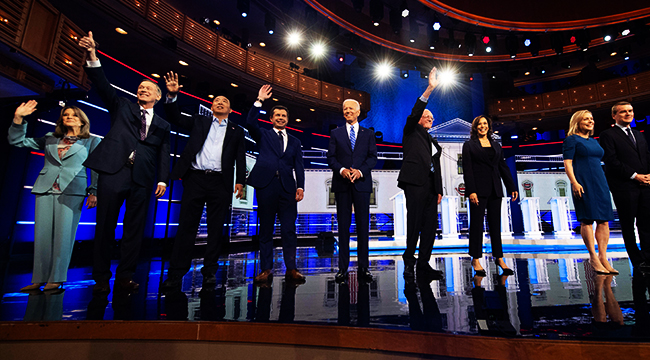
Despite that fact that we still have over a year until the general election, the race for the White House is heating up, thanks to a crowded Democratic primary. According to the New York Times‘s last count, 24 candidates are running for the privilege to go toe-to-toe with current President Donald Trump and only two candidates (Richard Ojeda and Eric Swalwell) have dropped out thus far. Which, of course, has made for some crowded debates and dizzying policy discussions.
So here’s what you need to know about the Democratic debates on Tuesday, July 30 and Wednesday, July 31 in order to not lose your mind.
You can watch it anywhere.
Each night, the debate will start at 8 p.m. ET. While the debate will be hosted in Detroit, Michigan by CNN, you’ll be able to watch it on CNN and Telemundo. Don’t have cable? You can livestream it at CNN.com.
Not everybody qualified — but it’ll still be a crowded stage.
Yes, there are 24 candidates, but only 20 candidates qualified for the upcoming debates. They are as follows:
- Michael Bennet
- Joe Biden
- Bill de Blasio
- Cory Booker
- Steve Bullock
- Pete Buttigieg
- Julián Castro
- John Delaney
- Tulsi Gabbard
- Kirsten Gillibrand
- Kamala Harris
- John Hickenlooper
- Jay Inslee
- Amy Klobuchar
- Beto O’Rourke
- Tim Ryan
- Bernie Sanders
- Elizabeth Warren
- Marianne Williamson
- Andrew Yang
If you’re thinking, holy shit, how will anyone get a word in edgewise? Don’t worry. They’re not going to be squeezed onto one stage.
The candidates have been split up and will be debating on two different nights.
In a bizarre, game show-esque display, CNN held a live draft, more or less, wherein they randomly drew names to split up the candidates into two groups.
The first night will be: Williamson, Ryan, Klobuchar, Buttigieg, Sanders, Warren, O’Rourke, Hickenlooper, Delaney, and Bullock.
The second night will be: Bennet, Gillibrand, Castro, Booker, Biden, Harris, Yang, Gabbard, Inslee, and de Blasio.
The network used grouping to guarantee that competitive candidates would be evenly spread across both nights, effectively guaranteeing interesting and intense debates each night. Sanders and Warren, who are often compared to one another, will face off on July 30, and Biden and Harris, who faced off in the first round of debates in June, will be sharing the stage again on the 31st.
The candidates who qualified for this debate may not qualify for the debates in September.
Per CBS News, the parameters for the September 12 and 13 debates will be much tougher: “In the third round of debates, candidates will need to both reach 2% in four polls and acquire donations from 130,000 unique donors.” These requirements effectively double the polling and donation thresholds candidates need to reach, a good way to narrow the field. In other words: it’ll be a much more focused field come the end of summer.
